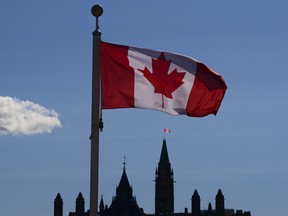David Wolf, a former adviser at the Bank of Canada who now is a portfolio manager at Fidelity Investments, said last week that he thinks inflationary pressures will force his former employer to raise interest rates in the first half of 2022. That’s sooner than implied by Governor Tiff Macklem’s official guidance, which states that the Bank of Canada won’t change the interest-rate setting until the second half of next year. The central bank’s models might be producing evidence of a weak economy, but the “facts on the ground” suggest something else, Wolf said at the Bloomberg Canadian Fixed Income Conference.
Wolf is in the minority. Millan Mulraine, chief economist at the Ontario Teachers’ Pension Fund, told the same conference that Macklem will tolerate faster inflation to complete the recovery from the COVID-19 crisis as soon as possible. The most recent data suggest price pressures have eased somewhat, albeit to hot from white hot. The test could be the extent to which businesses and consumers are willing to tolerate higher prices. Corporate profits and household savings are high. There’s cushion. Will we use it?
Wage worries
Not all inflation is bad. Job vacancies are at record levels, and that’s driving wages higher. Call it payback. For much of the past decade, economists wondered why labour wasn’t capturing a greater share of GDP amid surging corporate profits. Income gaps could start to narrow. That would be welcome.
Still, good inflation can turn bad. Employers could raise the prices of their goods and services to cover higher wage bills, sparking an inflationary spiral. It’s unclear if that’s happening. The Bank of Canada characterized wage growth as “moderate” in July, yet more recent anecdotal evidence suggests otherwise.
The data are messy because of everything that was going on a year ago. We’ve been watching a handful of industries that were mostly unaffected by the COVID-19 lockdowns, and comparing recent readings of average weekly earnings with same month in 2019 to avoid some of the noise created by the pandemic. Statistics Canada added July data on Sept. 28. Managers don’t seem to be getting ahead, but essential and in-demand workers appear to have gained some bargaining power.

The shortage of restaurant workers has replaced the price of lumber as everyone’s favourite post-pandemic talking point. Even famous chains such as McDonald’s Corp. and Chipotle Mexican Grill Inc. are struggling to fill jobs. Many industries are struggling with elevated vacancy rates, which measures the proportion of unfilled positions to the total number of occupied and unoccupied jobs (chart below). But the situation is most extreme at hotels, restaurants, and bars.
A knee-jerk explanation is that COVID-19 benefits are too generous. Why wash dishes when the government will pay you almost as much to stay at home and do nothing? There’s something to that notion, but probably not as much as the critics who land on that answer think. “After years of investing in an exploitative promise, the dining industry’s best and brightest workers, the cooks and floor staff whose poorly remunerated passion subsidized our luxury dinners, are fleeing the business,” Chris Nuttall-Smith, one of the country’s best food writers, observed in latest edition of Toronto Life magazine.
Take a look at the next chart. The restaurant industry is facing the highest vacancy rates in the country. And yet the average offered hourly wage had increased only five per cent in the second quarter from the same period in 2019, according to Statistics Canada data. It was by far the smallest increase among industries with above-average vacancy rates. Why wouldn’t restaurant workers flee? They aren’t being offered a reason to stay.

Creative destruction
One of former Bank of Canada governor Stephen Poloz’s favourite indicators was business formation. If an economy is adding companies, it is increasing its capacity to generate wealth without stoking inflation. The recovery from the Great Recession was weaker than Poloz predicted it would be. With hindsight, he realized that the financial crisis had wiped out so many exporters that Canada couldn’t participate in an upsurge in global demand to the degree it had in the past. It’s one of the reasons that he left interest rates so low for so long.
Postmortem: Why restaurant workers are fleeing the industry
2021-10-04 12:17:21





